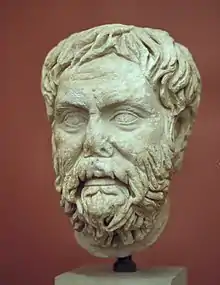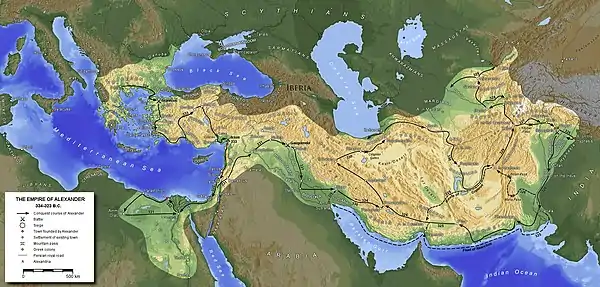Pyrrho
Pyrrho of Elis (/ˈpɪroʊ/; Ancient Greek: Πύρρων ὁ Ἠλεῖος, romanized: Pyrrhо̄n ho Ēleios; c. 360 – c. 270 BC) was a Greek philosopher of Classical antiquity and is credited as being the first Greek skeptic philosopher and founder of Pyrrhonism.
Pyrrho | |
|---|---|
 Pyrrho of Elis, marble head, Roman copy, Archeological Museum of Corfu | |
| Born | c. 360 BC |
| Died | c. 270 BC Elis, Greece |
| Era | Hellenistic philosophy |
| Region | Western philosophy |
| School | Skepticism Pyrrhonism |
Main interests | Epistemology, metaphysics, ethics |
Notable ideas | Philosophical skepticism, ataraxia, adiaphora, epoché |
Influences
| |
Influenced
| |
| Part of a series on |
| Pyrrhonism |
|---|
 |
|
|
Life

Pyrrho of Elis is estimated to have lived from around 365/360 until 275/270 BCE.[1] Pyrrho was from Elis, on the Ionian Sea. He was likely a member of the Klytidiai,[2] a clan of seers in Elis who interpreted the oracles of the Temple of Zeus at Olympia[3] where Pyrrho served as a high priest. The Klytidiai were descendants of Klytios, who was the son of Alcmaeon and the grandson of Amphiaraus. In the Python, Pyrrho's student Timon of Phlius describes first meeting Pyrrho on the grounds of an Amphiareion, i.e., a temple of Amphiaraus, while they were both on a pilgrimage to Delphi.[4]
Diogenes Laërtius, quoting from Apollodorus of Athens, says that Pyrrho was at first a painter, and that pictures by him were exhibited in the gymnasium at Elis. Later he was diverted to philosophy by the works of Democritus, and according to Diogenes Laërtius became acquainted with the Megarian dialectic through Bryson, pupil of Stilpo.[5] Unlike the founders of other Hellenistic philosophies, Pyrrho was not substantively influenced by Socrates.[6]
Pyrrho, along with Anaxarchus, travelled with Alexander the Great on his conquest of the east, "so that he even went as far as the Gymnosophists in India and the Magi" in Persia.[7] This exposure to Eastern philosophy, and in specific, Buddhist philosophy,[8] seems to have inspired him to create his new philosophy and to adopt a life of solitude. Returning to Elis, he lived in poor circumstances, but was highly honored by the Elians, who made him a high priest, and also by the Athenians, who conferred upon him the rights of citizenship.[9]
Pyrrho's pupils included Timon of Phlius, Hecataeus of Abdera, and Nausiphanes, who was one of Epicurus' teachers.[10] Arcesilaus was also a pupil of Pyrrho, and he maintained Pyrrho's philosophy except in name.[11] Upon becoming scholarch of the Platonic Academy, Arcesilaus transformed its teachings to conform with those of Pyrrho. This initiated Academic Skepticism, the second Hellenistic school of skeptical philosophy.[12]
Philosophy
Pyrrho himself left no writings.[13] His doctrines were recorded in the writings of his pupil Timon of Phlius. Unfortunately these works are mostly lost. Little is known for certain about the details of Pyrrho's philosophy and how it may have differed from later Pyrrhonism. Most of what we know today as Pyrrhonism comes through the book Outlines of Pyrrhonism written by Sextus Empiricus over 400 years after Pyrrho's death.
Most sources agree that the primary goal of Pyrrho's philosophy was the achievement of a state of ataraxia, or freedom from mental perturbation, and that he observed that ataraxia could be brought about by eschewing beliefs (dogma) about thoughts and perceptions. However, Pyrrho's own philosophy may have differed significantly in details from later Pyrrhonism. Most interpretations of the information on Pyrrho's philosophy suggest that he claimed that reality is inherently indeterminate, which, in the view of Pyrrhonism described by Sextus Empiricus, would be considered a negative dogmatic belief.[1]
A summary of Pyrrho's philosophy was preserved by Eusebius, quoting Aristocles, quoting Timon, in what is known as the "Aristocles passage."[7] There are conflicting interpretations of the ideas presented in this passage, each of which leads to a different conclusion as to what Pyrrho meant.[7]
"Whoever wants to live well (eudaimonia) must consider these three questions: First, how are pragmata (ethical matters, affairs, topics) by nature? Secondly, what attitude should we adopt towards them? Thirdly, what will be the outcome for those who have this attitude?" Pyrrho's answer is that "As for pragmata they are all adiaphora (undifferentiated by a logical differentia), astathmēta (unstable, unbalanced, not measurable), and anepikrita (unjudged, unfixed, undecidable). Therefore, neither our sense-perceptions nor our doxai (views, theories, beliefs) tell us the truth or lie; so we certainly should not rely on them. Rather, we should be adoxastoi (without views), aklineis (uninclined toward this side or that), and akradantoi (unwavering in our refusal to choose), saying about every single one that it no more is than it is not or it both is and is not or it neither is nor is not.[14]
It is uncertain whether Pyrrhonism was a small but continuous movement in antiquity or whether it died out and was revived. Regardless, several centuries after Pyrrho lived, Aenesidemus led a revival of the philosophy. Pyrrhonism was one of the two major schools of philosophical skepticism that emerged during the Hellenistic period, the other being Academic skepticism.[15] Pyrrhonism flourished among members of the Empiric school of medicine, where it was seen as the philosophic foundation to their approach to medicine, which was opposed to the approach of the Dogmatic school of medicine. Pyrrhonism fell into obscurity in the post-Hellenistic period.
Pyrrhonists view their philosophy as a way of life, and view Pyrrho as a model for this way of life. Their main goal is to attain ataraxia through achieving a state of epoché (i.e., suspension of judgment) about beliefs. One method Pyrrhonists use to suspend judgment is to gather arguments on both sides of the disputed issue, continuing to gather arguments such that the arguments have the property of isostheneia (equal strength). This leads the Pyrrhonist to the conclusion that there is an unresolvable disagreement on the topic, and so the appropriate reaction is to suspend judgement. Eventually the Pyrrhonist develops epoché as a habitual response to all matters of dispute, which results in ataraxia.
Ancient Indian influences on Pyrrho
Diogenes Laërtius' biography of Pyrrho[16] reports that Pyrrho traveled with Alexander the Great's army on its conquest of India (327 to 325 BCE) and based his philosophy on what he learned there:
...he even went as far as the Gymnosophists, in India, and the Magi. Owing to which circumstance, he seems to have taken a noble line in philosophy, introducing the doctrine of incomprehensibility, and of the necessity of suspending one's judgment....
The sources and the extent of the Indian influences on Pyrrho's philosophy, however, are disputed. Some elements of philosophical skepticism were already present in Greek philosophy, particularly in the Democritean tradition in which Pyrrho had studied prior to visiting India. Richard Bett heavily discounts any substantive Indian influences on Pyrrho, arguing that on the basis of testimony of Onesicritus regarding how difficult it was to converse with the gymnosophists, as it required three translators, none of whom understood any philosophy, that it is highly improbable that Pyrrho could have been substantively influenced by any of the Indian philosophers.[17]
According to Christopher I. Beckwith's analysis of the Aristocles Passage, adiaphora, astathmēta, and anepikrita are strikingly similar to the Buddhist three marks of existence,[18] indicating that Pyrrho's teaching is based on Buddhism. Beckwith disputes Bett's argument about the translators, as the other reports of using translators in India, involving Alexander the Great and Nearchus, say they needed only one interpreter, and Onesicritus was criticized by other writers in antiquity for exaggerating. Beckwith also contends that the 18 months Pyrrho spent in India was long enough to learn a foreign language, and that the key innovative tenets of Pyrrho's skepticism were only found in Indian philosophy at the time and not in Greece.[19] Other scholars, such as Stephen Batchelor[20] and Charles Goodman[21] question Beckwith's conclusions about the degree of Buddhist influence on Pyrrho. Conversely, while critical of Beckwith's tracts, Adrian Kuzminski sees credibility on his hypothesis.[22]
It has also been hypothesized that the gymnosophists were Jains, or Ajnanins,[23][24][25] and that these are likely influences on Pyrrho.[23] Authors see probable influence of Indian skepticism not only in Phyrronism,[26] but also in Buddhism itself as a common ground.[27]
Sources on Pyrrho
Pyrrho did not produce any written work.[7] Most of the information on Pyrrho's philosophy comes from his student Timon. Only fragments of what Timon wrote have been preserved, mostly by Sextus Empiricus, Diogenes Laertius, and Eusebius.
Most biographical information on Pyrrho, as well as some information concerning his demeanor and behavior, come from the works of mid-third century BC biographer Antigonus of Carystus.[7] Biographical anecdotes from Diogenes Laertius are also frequently cited; his work on Pyrrho's life drew primarily from Antigonus' accounts.[7]
See also
Notes
- Home., Bett, Richard Arnot (2000). Pyrrho, his antecedents, and his legacy. Oxford: Oxford University Press. ISBN 9780198250654. OCLC 43615424.
- Dee L. Clayman, Timon of Phlius: Pyrrhonism into Poetry ISBN 3110220806 2009 p51
- Pausanias, Graeciae Descriptio 6.17.6
- Eusebius of Caesaria Praeparatio Evangelica Chapter 18
- Diogenes Laërtius Lives of the Eminent Philosophers Book IX, Chapter 11, Section 61
- Richard Bett, "Pyrrho and the Socratic Schools", From the Socratics to the Socratic Schools: Classical Ethics, Metaphysics and Epistemology Routledge, March 12, 2015, p. 149 “There is no evidence of Pyrrho having regarded Socrates as an intellectual or ethical inspiration…. Similarly, one would be hard pressed to find any kind of link between the two in terms of philosophical “succession”….”
- Bett, Richard; Zalta, Edward (Winter 2014). "Pyrrho". The Stanford Encyclopedia of Philosophy. Retrieved February 19, 2018.
- Beckwith, Christopher I., Greek Buddha. Pyrrho's Encounter with Early Buddhism in Central Asia, Princeton University Press, Princeton and Oxford, 2015.
- Diogenes Laërtius Lives of the Eminent Philosophers Book IX, Chapter 11, Section 64, 65
- Diogenes Laërtius Lives of the Eminent Philosophers Book IX, Chapter 9, Section 69
- Eusebius of Caesarea, Praeparatio Evangelica Chapter VI
- Diogenes Laërtius Lives of the Eminent Philosophers Book IV, Chapter 6, Section 33
- Diogenes Laertius Lives of the Eminent Philosophers Book IX Chapter 11 Section 102
- Beckwith, Christopher I. (2015). Greek Buddha: Pyrrho's Encounter with Early Buddhism in Central Asia (PDF). Princeton University Press. pp. 22–23. ISBN 9781400866328.
- Popkin, Richard Henry (2003). The History of Scepticism : from Savonarola to Bayle (Revised ed.). Oxford: Oxford University Press. ISBN 9780198026716. OCLC 65192690.
- Diogenes Laërtius Lives of the Eminent Philosophers Book IX, Chapter 9
- Richard Bett, Pyrrho, His Antecedents and His Legacy, 2000, p177-8.
- Beckwith, Christopher I. (2015). Greek Buddha: Pyrrho's Encounter with Early Buddhism in Central Asia (PDF). Princeton University Press. p. 28. ISBN 9781400866328.
- Beckwith, Christopher I. (2015). Greek Buddha: Pyrrho's Encounter with Early Buddhism in Central Asia. Princeton University Press. p. 221. ISBN 9781400866328.
- Stephen Batchelor "Greek Buddha: Pyrrho’s encounter with early Buddhism in central Asia", Contemporary Buddhism, 2016, pp 195-215
- Charles Goodman, "Neither Scythian nor Greek: A Response to Beckwith's Greek Buddha and Kuzminski's "Early Buddhism Reconsidered"", Philosophy East and West, University of Hawai'i Press Volume 68, Number 3, July 2018 pp. 984-1006
- Kuzminski, Adrian (2021). Pyrrhonian Buddhism: A Philosophical Reconstruction. Routledge. ISBN 9781000350074.
- Barua 1921, p. 299.
- Jayatilleke 1963, pp. 129-130.
- Flintoff 1980.
- Sellars, John (2018). Hellenistic Philosophy. Oxford University Press. ISBN 9780191655630.
- Heirman, Ann; Bumbacher, Stephan Peter (2007). The Spread of Buddhism. Brill. ISBN 9789047420064.
References
- Algra, K., Barnes, J., Mansfeld, J. and Schofield, M. (eds.), The Cambridge History of Hellenistic Philosophy, Cambridge: Cambridge University Press, 1999.
- Annas, Julia and Barnes, Jonathan, The Modes of Scepticism: Ancient Texts and Modern Interpretations, Cambridge: Cambridge University Press, 1985.
- Barua, Benimadhab (1921). A History of Pre-Buddhistic Indian Philosophy (1st ed.). London: University of Calcutta. p. 468.
- Beckwith, Christopher I., Greek Buddha. Pyrrho's Encounter with Early Buddhism in Central Asia, Princeton University Press, Princeton and Oxford, 2015.
- Bett, Richard, "Aristocles on Timon on Pyrrho: The Text, Its Logic and its Credibility" Oxford Studies in Ancient Philosophy 12, (1994): 137–181.
- Bett, Richard, "What did Pyrrho Think about the Nature of the Divine and the Good?" Phronesis 39, (1994): 303–337.
- Bett, Richard, Pyrrho, His Antecedents, and His Legacy, Oxford: Oxford University Press, 2000.
- Brunschwig, Jacques, "Introduction: the Beginnings of Hellenistic Epistemology" in Algra, Barnes, Mansfeld and Schofield (eds.), The Cambridge History of Hellenistic Philosophy, Cambridge: Cambridge University Press, 1999, 229–259.
- Burnyeat, Myles (ed.), The Skeptical Tradition, Berkeley: University of California Press, 1983.
- Burnyeat, Myles and Frede, Michael (eds.), The Original Sceptics: A Controversy, Indianapolis: Hackett, 1997.
- Doomen, Jasper, "The Problems of Scepticism" Logical Analysis and History of Philosophy 10 (2007): 36–52.
- Flintoff, Everard (1980). "Pyrrho and India". Phronesis. 25 (1): 88–108. doi:10.1163/156852880X00052. JSTOR 4182084.
- Halkias, Georgios, "The Self-immolation of Kalanos and other Luminous Encounters among Greeks and Indian Buddhists in the Hellenistic world". Journal of the Oxford Centre for Buddhist Studies, Vol. VIII, 2015: 163–186.
- Hankinson, R.J., The Sceptics, London: Routledge, 1995.
- Jayatilleke, K.N. (1963). Early Buddhist Theory of Knowledge (PDF) (1st ed.). London: George Allen & Unwin Ltd. p. 524.
- Kuzminski, Adrian, Pyrrhonism; How the Ancient Greeks Reinvented Buddhism, Lanham, Lexington Books, 2008.
- Long, A.A., Hellenistic Philosophy: Stoics, Epicureans, Sceptics, University of California Press, 1986.
- Long, A.A. and Sedley, David, The Hellenistic Philosophers, Cambridge: Cambridge University Press, 1987.
- Striker, Gisela, "On the difference between the Pyrrhonists and the Academics" in G. Striker, Essays on Hellenistic Epistemology and Ethics, Cambridge: Cambridge University Press, 1996, 135–149.
- Striker, Gisela, "Sceptical strategies" in G. Striker, Essays on Hellenistic Epistemology and Ethics, Cambridge: Cambridge University Press, 1996, 92-115.
- Striker, Gisela, "The Ten Tropes of Aenesidemus" in G. Striker, Essays on Hellenistic Epistemology and Ethics, Cambridge: Cambridge University Press, 1996, 116–134.
- Svavarsson, Svavar Hrafn, "Pyrrho’s dogmatic nature", The Classical Quarterly, 52 (2002): 248–56.
- Svavarsson, Svavar Hrafn, "Pyrrho’s undecidable nature", Oxford Studies in Ancient Philosophy, 27 (2004): 249–295.
External links
| Library resources about Pyrrho |
- Bett, Richard. "Pyrrho". In Zalta, Edward N. (ed.). Stanford Encyclopedia of Philosophy.
- "Pyrrho". Internet Encyclopedia of Philosophy.
 Laërtius, Diogenes (1925). . Lives of the Eminent Philosophers. 2:9. Translated by Hicks, Robert Drew (Two volume ed.). Loeb Classical Library.
Laërtius, Diogenes (1925). . Lives of the Eminent Philosophers. 2:9. Translated by Hicks, Robert Drew (Two volume ed.). Loeb Classical Library.
